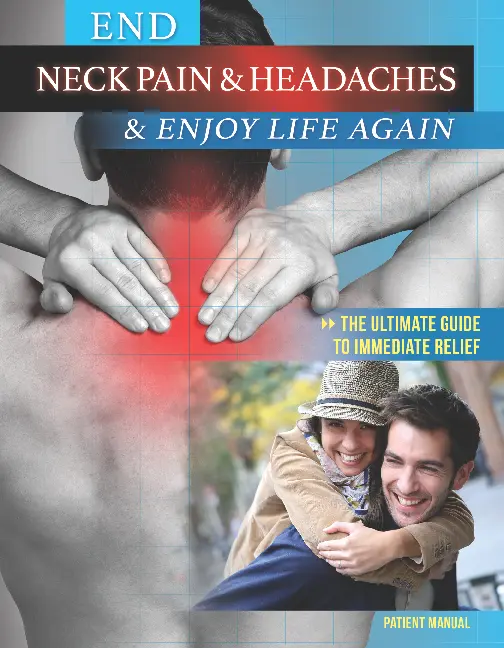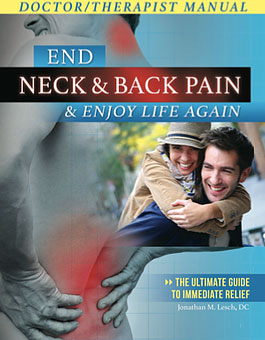Our
Services
We provide non-invasive treatments aimed at addressing musculoskeletal conditions, including back and neck pain, headaches, sciatica, and joint pain. We use a variety of techniques, such as spinal adjustments, soft tissue therapy, and exercise prescription, to improve mobility, reduce pain, and enhance overall well-being. We also provide education and advice on maintaining good posture, ergonomics, and healthy lifestyle habits.
"Escape Pain Now! Discover the Secrets of Chiropractic Relief!"
Suffering from pain? This easy-to-follow manual by Dr Lesch reveals the proven techniques to alleviate your pain and boost your health. Unlock the power of chiropractic care and experience freedom from pain with our expert guidance. Get your hands on this life-changing manual and transform your well-being today!
Patient Manual

End Neck Pain And Headaches

Doctor or Therapist

Whiplash:
Whiplash is a neck injury resulting from sudden, forceful back-and-forth movement, commonly occurring in motor vehicle accidents. Chiropractic care can help manage whiplash symptoms through spinal adjustments, soft tissue therapies, and recommending exercises and lifestyle modifications to promote healing.
Migraine Headaches:
Chiropractic care can help reduce the frequency and intensity of migraines by addressing any underlying musculoskeletal issues, such as cervical spine misalignments or muscle tension, and providing guidance on stress management, posture, and other lifestyle factors.
Herniated Disc:
A herniated disc occurs when the soft, gel-like center of an intervertebral disc bulges or ruptures through the outer fibrous ring. Chiropractic care can help manage herniated disc symptoms through spinal adjustments, decompression techniques, and soft tissue therapies.
Sciatica:
Sciatica is a type of radiculopathy that affects the sciatic nerve, causing pain, numbness, or weakness that radiates from the lower back to the buttock and down the leg. Chiropractic treatments can help alleviate pressure on the sciatic nerve through adjustments, spinal decompression, and soft tissue therapies.
Radiculopathy:
This occurs when a nerve root is compressed, irritated, or inflamed, causing pain, numbness, or weakness radiating along the affected nerve. Chiropractic adjustments, spinal decompression, and soft tissue therapies can help alleviate pressure on the nerve root and reduce inflammation.
Chronic Pain:
Chiropractic care can address the underlying causes of chronic pain, such as misalignments and joint restrictions, by performing adjustments and mobilizations, as well as recommending therapeutic exercises and lifestyle changes.
Subluxation:
Subluxations are misalignments or abnormal motion of spinal joints, which can cause pain, muscle imbalances, and nerve irritation. Chiropractors specialize in detecting and correcting subluxations through spinal adjustments and other therapeutic techniques.
Kyphosis:
This is an exaggerated curvature of the thoracic spine, which can lead to pain, stiffness, and postural issues. Chiropractic care can help manage kyphosis by performing adjustments to improve spinal alignment, recommending corrective exercises, and providing postural advice.
Scoliosis:
This is a sideways curvature of the spine, which can lead to pain, stiffness, and postural issues. Chiropractic care can help manage scoliosis through spinal adjustments to improve alignment, soft tissue therapies, and recommending corrective exercises and postural advice.
Cervicogenic Headaches:
These headaches originate from issues in the cervical spine, such as misalignments, muscle tension, or joint dysfunction. Chiropractic care can help alleviate cervicogenic headache symptoms by addressing underlying cervical issues through spinal adjustments, soft tissue therapies, and corrective exercises.
Joint Pain:
Chiropractors can treat joint pain caused by various factors, such as arthritis, injuries, or overuse, through joint mobilizations, soft tissue therapies, and guidance on exercises and lifestyle modifications to support joint health.
Plantar Fasciitis:
This condition involves inflammation and pain in the plantar fascia, a thick band of tissue connecting the heel bone to the toes. Chiropractic care can help alleviate plantar fasciitis symptoms by addressing biomechanical imbalances, providing soft tissue therapies, and recommending exercises and orthotics.
Temporomandibular Joint (TMJ) Dysfunction:
TMJ dysfunction occurs when the jaw joint and surrounding muscles are not functioning properly, causing pain, clicking, and limited movement. Chiropractors can provide treatments such as joint mobilization, soft tissue therapies, and exercises to help alleviate TMJ-related pain and improve function.
Carpal Tunnel Syndrome:
This condition involves compression of the median nerve within the carpal tunnel in the wrist, leading to pain, numbness, and weakness in the hand. Chiropractic care can help manage carpal tunnel syndrome through joint mobilizations, soft tissue therapies, and recommendations for ergonomic adjustments and exercises.
Osteoarthritis:
Osteoarthritis is a degenerative joint disease characterized by the breakdown of cartilage, causing pain, stiffness, and reduced range of motion. Chiropractic care can help manage osteoarthritis symptoms by providing joint mobilizations, soft tissue therapies, and guidance on exercises and lifestyle modifications to support joint health.
Fibromyalgia:
This is a complex chronic pain syndrome that involves widespread musculoskeletal pain, fatigue, and tender points throughout the body. Chiropractic care can help manage fibromyalgia symptoms through gentle spinal adjustments, soft tissue therapies, and guidance on exercises and lifestyle modifications to improve overall well-being.
Thoracic Outlet Syndrome:
This condition involves compression of the nerves and blood vessels between the collarbone and first rib, leading to pain, numbness, and weakness in the shoulder, arm, and hand. Chiropractic care can help manage thoracic outlet syndrome through spinal adjustments, joint mobilizations, and soft tissue therapies to alleviate compression and improve function.
Sacroiliac Joint Dysfunction:
Sacroiliac joint dysfunction occurs when the joint connecting the sacrum and ilium becomes misaligned or has abnormal motion, causing low back, buttock, or leg pain. Chiropractic care can help address sacroiliac joint dysfunction through spinal and pelvic adjustments, soft tissue therapies, and recommending exercises to stabilize the joint.
Frozen Shoulder (Adhesive Capsulitis):
Frozen shoulder is characterized by stiffness and pain in the shoulder joint, limiting range of motion. Chiropractic care can help manage frozen shoulder symptoms by providing joint mobilizations, soft tissue therapies, and recommending exercises to restore movement and flexibility.
Ankylosing Spondylitis:
This is a type of inflammatory arthritis that primarily affects the spine, causing pain and stiffness. Chiropractic care can help manage ankylosing spondylitis symptoms through gentle spinal adjustments, soft tissue therapies, and guidance on exercises and lifestyle modifications to maintain mobility and reduce inflammation.
Tension Headaches:
Tension headaches are often caused by muscle tension and stress, typically affecting the head, neck, and shoulders. Chiropractic care can help alleviate tension headache symptoms by addressing underlying musculoskeletal issues through spinal adjustments, soft tissue therapies, and stress management techniques.
Bursitis:
Bursitis is the inflammation of a bursa, a fluid-filled sac that reduces friction between tissues, causing pain and limited mobility in the affected joint. Chiropractic care can help manage bursitis symptoms by providing joint mobilizations, soft tissue therapies, and recommending exercises and lifestyle modifications to support joint health.
Piriformis Syndrome:
This condition occurs when the piriformis muscle compresses the sciatic nerve, causing pain and numbness in the buttock and leg. Chiropractic care can help manage piriformis syndrome by addressing muscle imbalances through soft tissue therapies, spinal adjustments, and recommending stretches and exercises.
Patellofemoral Pain Syndrome (Runner's Knee):
This condition involves pain in the front of the knee, often due to overuse or biomechanical imbalances. Chiropractic care can help address patellofemoral pain syndrome through joint mobilizations, soft tissue therapies, and recommending exercises to strengthen and balance the muscles around the knee.
Golfer's Elbow (Medial Epicondylitis):
This condition involves pain and inflammation on the inner side of the elbow, often due to overuse or repetitive strain. Chiropractic care can help manage golfer's elbow symptoms by providing joint mobilizations, soft tissue therapies, and recommending exercises to strengthen and stretch the affected muscles.
Tennis Elbow (Lateral Epicondylitis):
Tennis elbow is characterized by pain and inflammation on the outer side of the elbow, usually caused by overuse or repetitive strain. Chiropractic care can help address tennis elbow symptoms through joint mobilizations, soft tissue therapies, and recommending exercises to strengthen and stretch the affected muscles.
Iliotibial Band Syndrome:
This condition involves inflammation and pain in the iliotibial band, a thick band of fascia running along the outer thigh from the hip to the knee. Chiropractic care can help manage IT band syndrome by addressing biomechanical imbalances, providing soft tissue therapies, and recommending exercises to stretch and strengthen the affected muscles.
Shin Splints (Medial Tibial Stress Syndrome):
Shin splints are characterized by pain and inflammation along the inner edge of the shinbone, often caused by overuse or biomechanical issues. Chiropractic care can help manage shin splints through joint mobilizations, soft tissue therapies, and recommending exercises and orthotics to address biomechanical imbalances.
Achilles Tendinitis:
This condition involves inflammation and pain in the Achilles tendon, usually due to overuse or tight calf muscles. Chiropractic care can help manage Achilles tendinitis symptoms by providing soft tissue therapies, recommending exercises to stretch and strengthen the calf muscles, and addressing biomechanical imbalances.
Tennis Elbow (Lateral Epicondylitis):
Tennis elbow is characterized by pain and inflammation on the outer side of the elbow, usually caused by overuse or repetitive strain. Chiropractic care can help address tennis elbow symptoms through joint mobilizations, soft tissue therapies, and recommending exercises to strengthen and stretch the affected muscles.
Degenerative Disc Disease:
This condition is characterized by the breakdown of intervertebral discs, leading to pain, stiffness, and reduced range of motion in the spine. Chiropractic care can help manage degenerative disc disease symptoms by providing spinal adjustments, decompression techniques, and recommending exercises and lifestyle modifications to support spinal health.
Shin Splints (Medial Tibial Stress Syndrome):
Shin splints are characterized by pain and inflammation along the inner edge of the shinbone, often caused by overuse or biomechanical issues. Chiropractic care can help manage shin splints through joint mobilizations, soft tissue therapies, and recommending exercises and orthotics to address biomechanical imbalances.
Psoas Syndrome:
This condition involves tightness and dysfunction of the psoas muscle, which can cause low back pain, hip pain, and postural imbalances. Chiropractic care can help manage psoas syndrome by providing soft tissue therapies, spinal and pelvic adjustments, and recommending exercises to stretch and strengthen the psoas muscle..
Rib Dysfunction:
Rib dysfunction occurs when a rib becomes misaligned or has abnormal motion, causing pain and discomfort in the chest, back, or shoulder. Chiropractic care can help address rib dysfunction through spinal and rib adjustments, soft tissue therapies, and recommending exercises to improve thoracic mobility and stability.
Myofascial Pain Syndrome:
This condition involves chronic pain and inflammation in the muscles and connective tissues (fascia). Chiropractic care can help manage myofascial pain syndrome by providing soft tissue therapies, such as myofascial release and trigger point therapy, along with spinal adjustments and recommendations for exercises and stretches.
Coccydynia:
Coccydynia is pain in the tailbone area, often resulting from trauma, prolonged sitting, or other factors. Chiropractic care can help manage coccydynia by providing pelvic adjustments, soft tissue therapies, and recommending exercises and lifestyle modifications to alleviate pressure on the tailbone.
Sprains and Strains:
Chiropractic care can help manage symptoms of sprains and strains, which involve injuries to ligaments and muscles or tendons, respectively. Treatment may include joint mobilizations, soft tissue therapies, and recommendations for exercises and lifestyle modifications to promote healing and prevent future injuries.
Rotator Cuff Injuries:
Rotator cuff injuries involve damage to the muscles and tendons that stabilize the shoulder joint, causing pain, weakness, and reduced range of motion. Chiropractic care can help manage rotator cuff injuries through joint mobilizations, soft tissue therapies, and recommending exercises to strengthen and balance the shoulder muscles.
Postural Issues:
Poor posture can lead to pain, muscle imbalances, and reduced mobility. Chiropractic care can help address postural issues by providing spinal adjustments, soft tissue therapies, and recommending exercises and lifestyle modifications to improve posture and maintain spinal health.
Pregnancy-Related Pain:
Many pregnant women experience pain and discomfort due to changes in posture, weight distribution, and hormonal shifts. Chiropractic care can help manage pregnancy-related pain by providing gentle spinal and pelvic adjustments, soft tissue therapies, and recommending exercises and lifestyle modifications to support a healthy pregnancy.
Pinched Nerve:
A pinched nerve occurs when surrounding tissues, such as bones, cartilage, muscles, or tendons, apply excessive pressure to a nerve, causing pain, numbness, or weakness. Chiropractic care can help alleviate pinched nerve symptoms by performing spinal adjustments, joint mobilizations, and soft tissue therapies to reduce nerve compression and inflammation.
Neck Tension:
Neck tension is often caused by muscle tightness, poor posture, or stress, leading to discomfort, stiffness, and sometimes headaches. Chiropractic care can help address neck tension through spinal adjustments, soft tissue therapies, postural advice, and stress management techniques.
Physical Therapy:
Chiropractors may work in conjunction with physical therapists or provide similar services to help patients recover from injuries, improve mobility, and maintain overall musculoskeletal health. Chiropractic care can complement physical therapy by offering spinal adjustments, joint mobilizations, soft tissue therapies, and exercise recommendations.
Work Injury and Workers' Compensation:
Work injuries can result from various causes, such as repetitive strain, poor ergonomics, or accidents. Chiropractic care can help manage work-related injuries through spinal adjustments, soft tissue therapies, and providing guidance on ergonomics, exercises, and lifestyle modifications to promote healing and prevent future injuries. Chiropractors may also be involved in the workers' compensation process, providing documentation and collaborating with other healthcare providers to support the patient's recovery.
Car Accident, No-Fault, and Auto Injury:
Chiropractors often treat patients who have sustained injuries in car accidents, such as whiplash, soft tissue injuries, or spinal misalignments. Chiropractic care can help manage auto accident injuries through spinal adjustments, soft tissue therapies, and recommending exercises and lifestyle modifications to promote healing. Chiropractors may also work with patients' attorneys, insurance providers, or other healthcare providers to ensure proper documentation and support for any necessary legal processes.
Disc Herniation and Disc Bulge:
Although previously discussed, it is worth mentioning that chiropractic care can help manage disc herniation and disc bulge symptoms by providing spinal adjustments, decompression techniques, and soft tissue therapies to alleviate pressure on the nerves, reduce inflammation, and promote healing.
Costochondritis:
Costochondritis is an inflammation of the cartilage that connects a rib to the breastbone (sternum), causing chest pain that may be mistaken for a heart attack. Chiropractic care can help manage costochondritis symptoms by performing gentle spinal and rib adjustments, soft tissue therapies to reduce inflammation, and recommending stretches and exercises to improve rib mobility and reduce stress on the affected area.
De Quervain's Tenosynovitis:
De Quervain's tenosynovitis is a painful condition affecting the tendons on the thumb side of the wrist, often caused by overuse or repetitive strain. Chiropractic care can help manage De Quervain's tenosynovitis by providing soft tissue therapies, joint mobilizations, and recommending exercises and lifestyle modifications to alleviate symptoms and promote healing.
Hours:
Monday 9 am to 5 pm
Tuesday 9 am to 4:30 pm
Wednesday 9 am to 5 pm
Thursday 9 am to 4:30 pm
Friday 9 am to 3 pm
Saturday: Appointment Only
Sunday: Closed
33 William Street, Suite 4, Auburn NY 13021
Free Parking
Serving Auburn NY
And Surrounding Areas: Skaneateles NY, Weedsport NY, Elbridge Moravia NY, Montezuma NY, Aurora NY, Union Springs NY, Owasco NY, Fleming NY, Brutus NY, Sennett NY, Niles NY, Throop NY, Genoa NY, Sempronius, NY
© 2024 Lesch Chiropractic Auburn NY - All Rights Reserved
